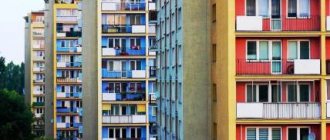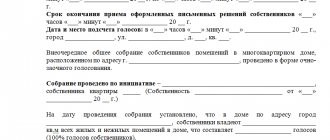The general meeting of owners of premises in an apartment building , in accordance with Part 1 of Article 44 of the Housing Code of the Russian Federation, is recognized as the management body of the house. The general meeting is held so that the management company, together with the property owners, can discuss a number of topical issues and problems on the agenda by voting and making decisions.
The general meeting of homeowners can be held in three forms (Article 44.1 of the Housing Code of the Russian Federation):
- in-person voting - in the presence of owners of premises in the house to discuss issues on the agenda and make decisions on issues put to vote;
- absentee voting - by means of a questionnaire, if the meeting in person did not take place due to lack of quorum (Part 1 of Article 47, Article 47.1 of the Housing Code of the Russian Federation).
- in-person and absentee voting - using the GIS housing and communal services system (Part 3 of Article 47 of the Housing Code of the Russian Federation). The decision to use the GIS Housing and Public Utilities when conducting the OSS in the form of absentee voting is made by the general meeting of premises owners (Clause 3.2, Part 2, Article 44, Part 1, Article 47.1 of the Housing Code of the Russian Federation).
In-person and absentee voting
When and why is it necessary to conduct an OSS in the form of in-person and absentee voting of owners ? After all, for this there are separate forms of in-person and absentee voting. The thing is that both of these forms do not always bring results, since often there is simply not a quorum to make important decisions at the general meeting of homeowners.
In-person and absentee voting combines both forms of conducting an OSS and allows you to discuss issues on the agenda in person and make decisions on them, as well as transfer decisions of homeowners by absentee voting within the prescribed period to the address specified in the notice of the event (Part 3 Article 47 of the Housing Code of the Russian Federation). Read more about this in our article.
This is convenient because if during the in-person voting there was not a quorum to make decisions on the issues on the agenda, then it can be achieved through absentee voting. Particularly relevant is the in-person and absentee form of voting by homeowners when considering agenda items on which decisions are required by 2/3 of the votes of the owners of premises in the apartment building (clauses 1.1-1, 1.2, part 2, article 44 of the Housing Code of the Russian Federation).
The concept of “general meeting of owners of premises in an apartment building”
The general meeting of owners of premises in an apartment building is a procedure regulated by the housing codified act. It is with the help of such an event that citizens resolve issues related to the management of property located in a building classified as an apartment building.
It is worth noting that the general meeting of owners of premises in an apartment building, according to current laws, is the responsibility of certain persons. And it should be carried out regularly (every year). However, the RF Housing Code does not have a mechanism that monitors the fulfillment of such an obligation.
The general meeting of owners of premises in an apartment building can be either regular or extraordinary. The first event is held once a year, the second, according to the current Housing Code of the Russian Federation, can be organized at any time on the initiative of any person who owns a residential area. Please note: the power of initiative of such citizens is not related to the dimensions of the residential area they have.
List of issues within the competence of the general meeting
The general meeting of owners of premises in an apartment building, according to the current Housing Code of the Russian Federation, is designed to resolve certain issues. Here is just a sample list of such questions:
- choosing a method of managing a house that can be classified as multi-apartment;
- placement of additional parking spaces;
- transfer under a lease agreement of vacant residential premises;
- establishing payment for the use of this or that property (for example, using the services of Internet providers);
- placement of advertising information at the entrances, and so on.
The general meeting of owners of premises in an apartment building, according to the Housing Code of the Russian Federation, resolves issues directly related to premises in a residential building that do not relate to apartments. For example, we are talking about elevators, roofs, land-type plots, and so on.
Thus, holding such an event can resolve many problematic situations and make the life of the owners of a residential area better and of higher quality.
Comments to ST 45 Housing Code of the Russian Federation
Article 45 of the RF Housing Code. The procedure for holding a general meeting of premises owners in an apartment building
Commentary on Article 45 of the RF Housing Code:
1. The commented article contains rules establishing some organizational procedures related to holding a general meeting of owners of premises in an apartment building. There are two types of general meetings:
- annual, which are held within the time frame and in the manner established by the decision of the general meeting;
— extraordinary, which are convened on the initiative of any of the owners of premises located in a given apartment building.
Annual general meetings are mandatory, and extraordinary meetings are convened as necessary. The legislator does not limit the number of extraordinary general meetings convened during the year.
2. By establishing the obligation to hold a general meeting of owners of premises in an apartment building, the legislator thereby encroaches on what is enshrined in Art. 31 of the Constitution of the Russian Federation, the right to freely hold meetings, which is the most important element of the legal status of a citizen of the Russian Federation. It seems that the norm enshrined in Part 1 of the comment. Art., is stillborn, since its actual implementation is difficult, and the very obligation to hold annual meetings is not supported by a measure of responsibility for its failure to fulfill it.
3. Part 3 contains the rule on the competence of the general meeting of owners of premises in an apartment building. Competence in this case means the legitimacy of the meeting itself and the legal significance of the decisions it makes.
A meeting is considered valid if it is attended by the owners of premises in a given building or their representatives holding more than 50% of the votes of the total number of votes of the owners. The number of votes that each owner of the premises has, regardless of the type of premises, is proportional to his share in the right of common ownership of the common property of the apartment building.
The presence of the owners of premises and their representatives at the general meeting must be recorded on the attendance sheet or in another way that allows the owner or his representative to be identified. Representatives of premises owners act on the basis of powers of attorney issued by the owners. The power of attorney takes a simple written form. When voting on issues that involve the execution of transactions requiring a notarial form, the power of attorney must be notarized.
Legal entities with special legal capacity may issue powers of attorney to carry out transactions that do not contradict the goals of their activities.
Several owners of premises can act as a principal.
If the owners of the premises or their representatives, who collectively have more than fifty percent of the votes of the total number of votes, are absent from the general meeting, the general meeting is considered invalid. In this case, a new general meeting must be held, which the legislator calls repeated. The period during which the owners of premises are obliged to hold a second meeting is not established by law.
4. Preparation for the general meeting begins with the sending by the initiator of its holding to all, without exception, owners of the premises of the relevant notifications. Notifications, the text of which must be uniform, are handed to the owners of premises against signature or sent by registered mail or posted in the premises of a given building accessible to all owners in the form of a notice of a meeting. The form of notification in the form of registered letters may, by decision of the general meeting, be replaced by another method of sending a message about the holding of a general meeting, which must be in writing. The place where a notice of a general meeting can be posted must be established by a decision of the general meeting. Obviously, a notice of the first general meeting, including in a publicly accessible area, cannot be considered appropriate.
Notices of the general meeting must be sent to the owners of the premises no later than ten days before the scheduled date of the meeting. Therefore, the date of delivery of the notice, the date of its sending by mail, the date of posting the message in the premises of a given house accessible to all owners must be recorded, respectively, in receipts or postal receipts, or can be confirmed by the testimony of witnesses.
5. In part 5 comments. Art. requirements are formulated for the content of the message about holding a general meeting of owners of premises in an apartment building. These requirements must be strictly adhered to.
6. The holding of a general meeting of owners of premises in an apartment building, especially the first one, must be preceded by very significant and labor-intensive work by the initiator of the meeting or the initiative group, associated not only with the preparation, delivery or distribution of written notices, but also with the solution of a number of other organizational issues. Practice shows that a well-prepared meeting, as a rule, takes place without noticeable rally passions, mutual reproaches and distrust of the initiator of the meeting.
Among the main issues that the initiator of the general meeting needs to resolve before holding it are the following.
Firstly, the initiator of the meeting or the person entrusted with organizing and conducting the meeting must familiarize himself with the basic provisions of the current legislation governing relations arising regarding the legal regime of the common property of premises owners and the management of an apartment building.
Secondly, the initiator of the meeting must have data on the size of shares in the ownership of common property in an apartment building.
Thirdly, the initiator of the meeting must prepare in advance a form of attendance sheet with details that allow identifying one or another owner of the premises or his representative, as well as voting ballots and a voting protocol form.
Fourthly, if a decision is made to form a homeowners’ association, the initiator of the meeting must have copies of the draft charter of the homeowners’ association. The best option would be to hand over the draft charter of the partnership to each owner together with a notice of the general meeting.
Features of holding a general meeting of premises owners in an apartment building
The holding of the meeting is strictly regulated by the Housing Code of the Russian Federation. The first stage of this procedure is notification. The notice of the meeting must be distributed no later than ten days before the event itself; this must be done by the initiator. Such a notification can be sent using a registered letter, and every citizen-owner must receive it. A document about such an event, which concerns issues related to residential space, can be presented to each person personally.
The authority stipulates that such a document must include the following data:
- Full name of the owner, number of his residential apartment;
- method of holding the event (according to current laws, it can be in person, in absentia or combined);
- the date of the event, as well as the place where it will take place;
- agenda (that is, the topic of the procedure);
- the procedure for familiarizing the owners with information.
Before holding a meeting, you should ask the management company about the area of residential premises. In addition, the initiator must collect information about each participant.
It is necessary to find out whether there are areas in the house owned by a government agency or one or another municipal body. In this case, it is necessary to send a corresponding notification to the administrative authority. After this, it is necessary to prepare ballots for registration of participants.
Before signing the protocol, you need to choose the form in which voting will take place. It can be of the following types:
- face-to-face method (in this case, participants come to the event and cast their votes in person);
- in-person-absentee method (according to the Housing Code of the Russian Federation, in this case, some participants can vote in person, and those who did not come to the event have the opportunity to vote in absentia - this method is considered the most acceptable in modern times);
- correspondence method (in this case, certain initiators can go around the apartments and invite residents to express their opinion on a particular issue).
Presentation of meeting results
The decision of the general meeting of premises owners must be binding for each tenant. In order for the results of such an event to be properly documented, a special document is drawn up - a protocol. The minutes of the general meeting of premises owners is an official document that may have legal consequences. If necessary, each participant may have a copy of such a document. The protocol must contain the following information:
- the date of the event, as well as the place where it is held;
- the method of its implementation (that is, full-time, part-time or combined);
- address of a residential building, which can be classified as an apartment building;
- total residential area;
- the number of participants who attended the event and voted;
- agenda;
- results of the survey;
- a clearly formulated solution to each issue.
The minutes of the meeting, depending on the method of conducting the procedure, may also include registration sheets (in case of in-person meeting) or ballots (in case of absentee meeting).
After conducting the survey, according to the Housing Code of the Russian Federation, it is necessary to transfer photocopies of a document such as a protocol, as well as photocopies of ballots, to the appropriate body - a management company. Within ten days, the initiator must also notify the owners of residential areas about the decisions made.
If necessary, any other authority must be informed about the results.





